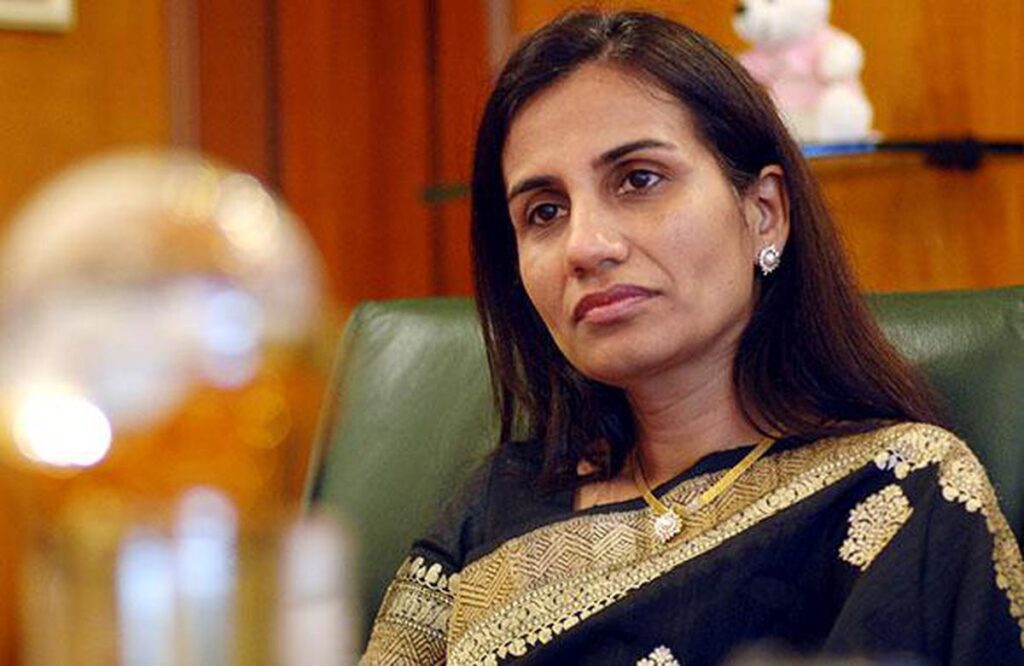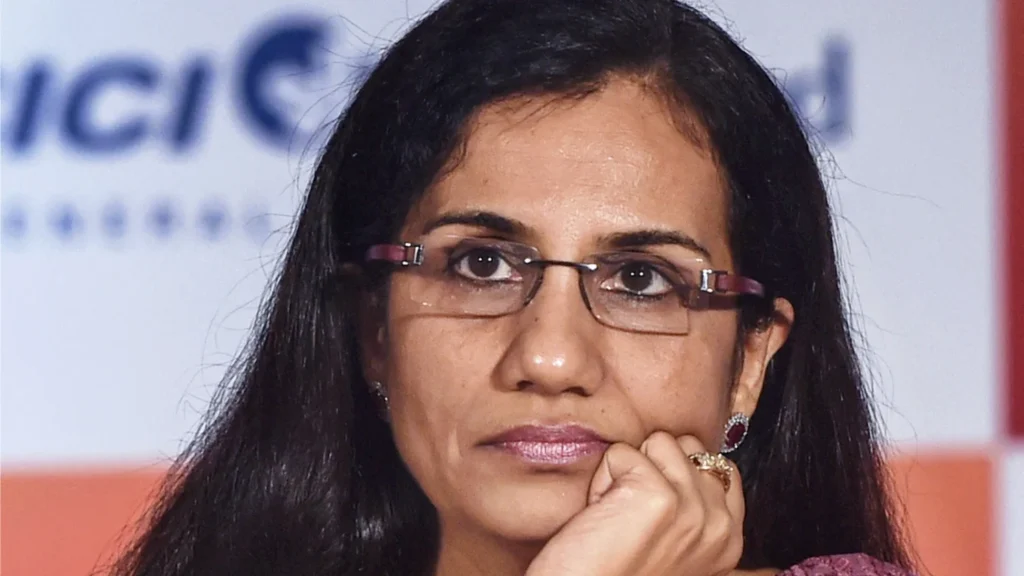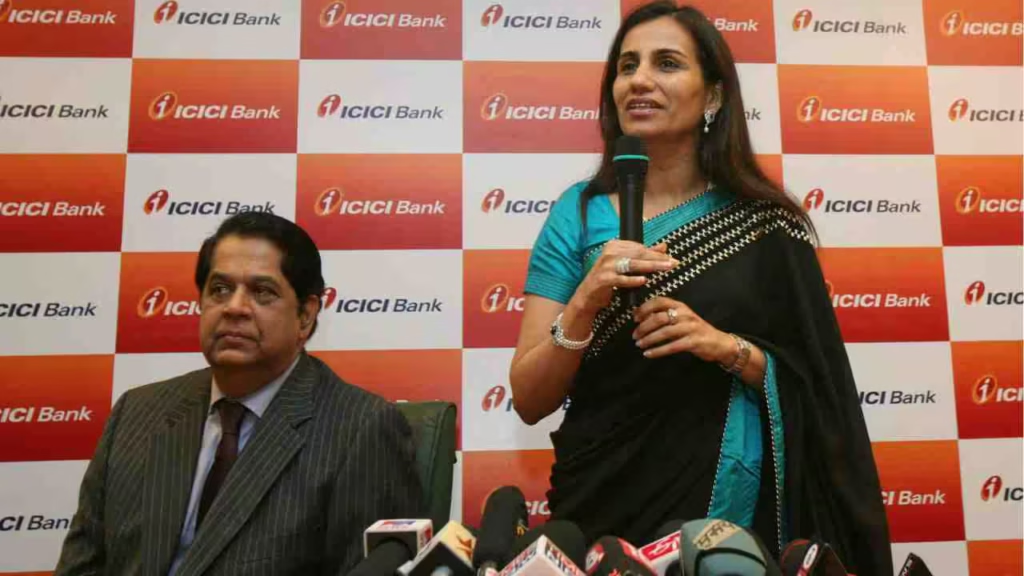Chanda Kochhar, once a celebrated figure in Indian banking, faces severe legal scrutiny in the ICICI Bank-Videocon loan fraud case. Found guilty of accepting a ₹64 crore bribe for sanctioning a ₹300 crore loan, her case highlights issues of corporate governance and ethical lapses in India’s banking sector.
This article delves into the current status of the case, Kochhar’s career, future outlook, fraud analysis with timezone context, money involved, recovery status, her educational background, and major bank frauds in India over the past five years.
Current Case Status
On July 3, 2025, the Appellate Tribunal under the SAFEMA Act ruled that Chanda Kochhar, former ICICI Bank CEO, accepted a ₹64 crore bribe for sanctioning a ₹300 crore loan to Videocon International Electronics Ltd in 2009, part of a larger ₹3,250 crore credit facility to Videocon Group companies. The tribunal overturned a 2020 decision that had released attached assets, upholding the Enforcement Directorate’s (ED) money laundering charges, citing a “prima facie” case of quid pro quo involving Kochhar’s husband, Deepak Kochhar.

Assets, including a Mumbai Churchgate flat, were reattached as proceeds of crime.Chanda Kochhar joined ICICI Bank in 1984 as a management trainee, rising to become its Managing Director and CEO in 2009, the first woman to lead a major Indian bank. Her tenure was marked by ICICI’s growth as India’s second-largest private lender. She received the Padma Bhushan in 2011 and was listed in Forbes’ “World’s 100 Most Powerful Women” and TIME’s “100 Most Influential People” in 2015. Her career unraveled in 2018 amid whistleblower allegations of conflicts of interest, leading to her resignation in October 2018. At the time, she held 6,90,000 ICICI shares through ESOPs.
Kochhar and her husband were arrested by the CBI on December 23, 2022, but granted interim bail by the Bombay High Court in January 2023, which ruled the arrests “arbitrary” and an “abuse of power” due to procedural lapses. The Supreme Court dismissed the CBI’s appeal against this bail in 2023, and the couple remains on bail. The case is under active CBI and ED investigation, with the Supreme Court monitoring proceedings. Further appeals are likely as the trial progresses.
Chanda Kochhar’s Career History
Chanda Kochhar joined ICICI Bank in 1984 as a management trainee, rising to become its Managing Director and CEO in 2009, the first woman to lead a major Indian bank. Her tenure was marked by ICICI’s growth as India’s second-largest private lender. She received the Padma Bhushan in 2011 and was listed in Forbes’ “World’s 100 Most Powerful Women” and TIME’s “100 Most Influential People” in 2015.
Her career unraveled in 2018 amid whistleblower allegations of conflicts of interest, leading to her resignation in October 2018. At the time, she held 6,90,000 ICICI shares through ESOPs.

Future Outlook
The case remains a landmark in India’s fight against corporate fraud. Kochhar may appeal the tribunal’s July 2025 ruling, potentially prolonging legal proceedings. The ED and CBI are building their prosecutions, focusing on money laundering and corruption charges. The Supreme Court’s oversight ensures continued scrutiny, and a trial court will determine final culpability.
The case may prompt stricter regulations on banking governance, emphasizing conflict-of-interest disclosures and CEO accountability. Public and investor trust in ICICI Bank, now distanced from Kochhar, may hinge on the case’s resolution.
Fraud Analysis with Timezone Context
The fraud occurred between 2009 and 2011, with a key transaction on September 8, 2009, when ICICI Bank disbursed a ₹300 crore loan to Videocon International Electronics Ltd. The next day, September 9, 2009, ₹64 crore was transferred from Videocon’s Supreme Energy Pvt Ltd to NuPower Renewables, controlled by Deepak Kochhar.
Given Mumbai’s IST timezone (UTC+5:30), the rapid 24-hour transfer suggests premeditated coordination, as the funds moved almost immediately post-disbursement, indicating a structured quid pro quo. The tribunal noted Kochhar’s failure to disclose her husband’s ties, a breach of fiduciary duty, amplifying the fraud’s audacity.
Amount of Money Involved and Recovery Status
The total loan amount was ₹3,250 crore to Videocon Group companies, with ₹1,875 crore disbursed between 2009 and 2011, of which ₹1,730 crore became non-performing assets (NPAs), causing significant losses to ICICI Bank.
The bribe was ₹64 crore, routed through Supreme Energy to NuPower Renewables. The ED attached assets worth ₹78 crore, including a Churchgate flat valued at ₹5.25 crore in 1995 (appreciated significantly by 2016).

As of July 2025, these assets remain attached, but no additional recovery of the ₹64 crore bribe or NPA losses is confirmed in the sources.
Chanda Kochhar’s Educational Qualifications
Chanda Kochhar holds a Bachelor’s degree in Economics from Jai Hind College, Mumbai, and an MBA from Jamnalal Bajaj Institute of Management Studies, Mumbai.
She also completed a Cost Accountancy course from the Institute of Cost Accountants of India, equipping her with a strong financial foundation that fueled her rise in banking.
Bank Frauds in India (Last Five Years)
Bank frauds in India have surged, with public and private banks reporting significant losses. Below is a summary of major frauds from 2020 to 2025, based on available data:
- 2020-2021: Punjab National Bank (PNB) fraud involving Nirav Modi and Mehul Choksi, with ₹14,000 crore in fraudulent letters of undertaking. Partial recovery (~₹2,000 crore) achieved.
- 2021-2022: ABG Shipyard fraud at SBI and 27 other banks, involving ₹22,842 crore in misappropriated loans. Recovery ongoing, limited progress.
- 2022-2023: ICICI-Videocon case (Kochhar), ₹3,250 crore loan fraud, ₹1,730 crore NPAs. Assets worth ₹78 crore attached, no full recovery.
- 2023-2024: Bank of Baroda reported frauds worth ₹5,000 crore across multiple cases, with minimal recovery.
- 2024-2025: YES Bank fraud involving DHFL promoters, ₹3,700 crore misappropriation. Recovery efforts stalled.
Table: Total Money Involved in Major Bank Frauds (2020-2025)
| Year | Bank/Fraud Case | Amount Involved (₹ Crore) | Amount Recovered (₹ Crore) |
|---|---|---|---|
| 2020-2021 | PNB (Nirav Modi) | 14,000 | ~2,000 |
| 2021-2022 | ABG Shipyard | 22,842 | Minimal |
| 2022-2023 | ICICI-Videocon (Kochhar) | 3,250 | 78 (assets attached) |
| 2023-2024 | Bank of Baroda (Multiple) | 5,000 | Minimal |
| 2024-2025 | YES Bank (DHFL) | 3,700 | Negligible |
| Total | 48,792 | ~2,078 |
Note: Data is approximate, drawn from public reports and RBI statements. Recovery figures are incomplete due to ongoing investigations.
Conclusion
The Chanda Kochhar-Videocon case underscores systemic issues in India’s banking sector, from lax oversight to conflicts of interest. With Kochhar found guilty of a ₹64 crore bribe, the ongoing legal battle and asset attachments signal a push for accountability. Her illustrious career, marked by a strong educational foundation, contrasts sharply with her fall from grace. As India grapples with ₹48,792 crore in frauds over five years, stricter governance and transparency are critical to restoring trust in banking.

Comments